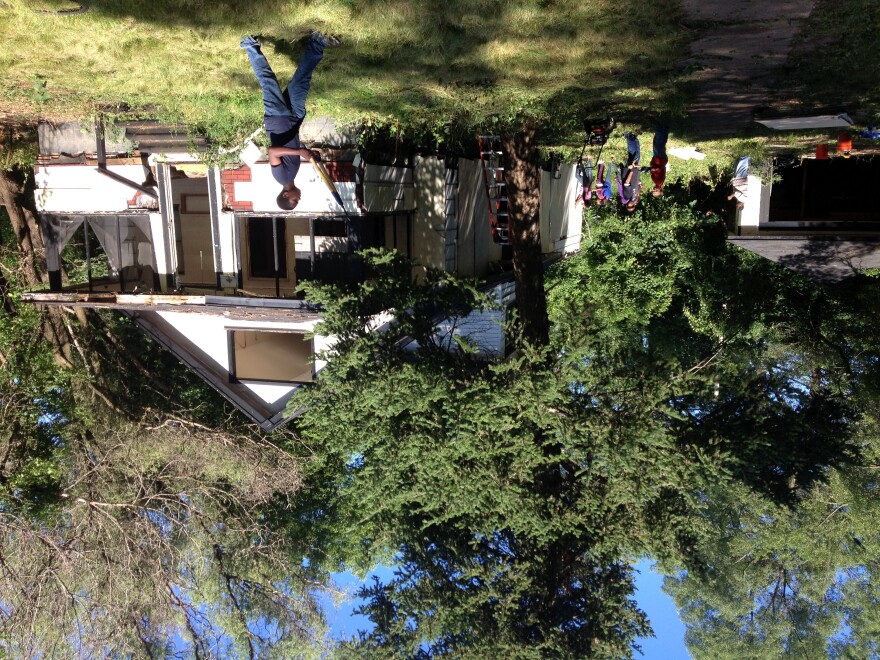Detroit’s bankruptcy has been national, even international, news for more than a week now. But inside Detroit, many residents say they feel like they’ve been living in a bankrupt city for years. They’ve been working to do what the city should be doing, but doesn’t have the money to do. And they say more of their neighbors need to realize: nobody’s going to “save” their city but themselves.
Twenty-five years ago, John George got fed up with the blight in his neighborhood. He marshaled some neighbors, and boarded up the house in back of his.
That effort evolved into a group he calls Motor City Blight Busters.
“We just got done tearing down both these properties to your right and your left and this house is going to be next,” he said.
George’s crew is demolishing the vacant homes on two city blocks, and plans a large-scale garden for the neighborhood.
Let’s be clear here: It’s the city’s job to board up and tear down dangerous abandoned buildings, but there are almost 40,000 of them. The city just doesn’t have the money to put much of a dent in the problem, let alone keep on top of it.
George says he’s demolished, boarded up, built or rehabbed 1,500 buildings since 1988. He loves this city. But he says he doesn’t count on city hall for much of anything.
“What I would suggest instead is people should do what I did. Get your neighbors together, get a rake, get a broom, and get busy.”

And, in pockets of the city, people have done just that.
About a mile away, Riet Schumack, in glasses and a pink T-shirt, tells some teenagers up on ladders the right way to board up a vacant house.
They spent the day before clearing all the shrubs and trees from the perimeter. Neighbors say you couldn’t even see the house.
Schumack has been working to transform block after block of her notorious Brightmoor neighborhood. She’s recruited neighborhood kids to board up houses, put out trash cans, and make new parks where houses have been torn down.
Schumack says when she heads to a new block and starts knocking on doors, things often play out like this:
“You have the famous ‘they’ conversation. So people will say ‘well, they are never picking up my garbage. Or ‘they are not boarding up the houses.’ Or, ‘they came and boarded up the houses.’ So our question is well, who are the ‘they?’ And that has to change. That ‘they’ has to become ‘us.’”
Julius Gordon is one of the “us.” He’s 19. He says he walks the neighborhood now. There are fewer drug dealers, less trash.
But there is still crime here. And that is a huge issue throughout the city.
Muhsin Muhammad has been part of his neighborhood’s crime watch since 1995. Lorenzo Blount is driving. Tony Bailey sits shotgun with a clipboard in his lap.
They drive the 42 blocks of their Grandmont neighborhood looking for anything or anybody that’s out of place. Today is pretty quiet. The guy on the bike rode out of the neighborhood. They never found a lost pitbull named “Money.”
Lorenzo Blount says he does this for one reason.
“Self-preservation. Nobody’s coming to help us, so we gotta help ourselves.”
In Detroit, the average time it takes police to respond to a 911 call is 58 minutes. The national average? About 11 minutes.
So Blount’s patrol and about 25 others help out in different neighborhoods. They’re trained by and work closely with the police department – which could use all the help it can get.
City officials say they wholeheartedly support volunteer efforts.
But the scale of Detroit’s need is pretty staggering. And there are some gaps that grassroots efforts can’t really fill. Like the 40 percent of streetlights that are broken.
But the people in these neighborhoods say bankruptcy makes no difference to their efforts.
Riet Schumack from Brightmoor says “we didn’t get anything before the bankruptcy, we’re not going to get anything after it.”





